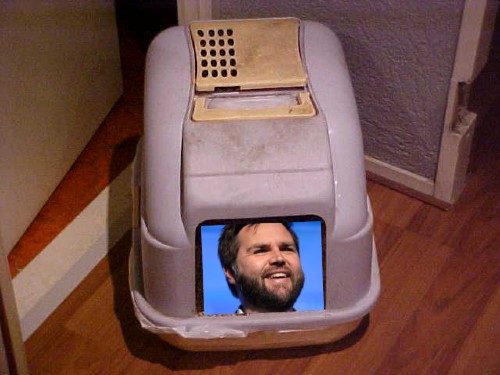
“We’re effectively run in this country,” J.D. Vance told Tucker Carlson in 2021, “be it the Democrats, be it our corporate oligarchs, by a bunch of childless cat ladies who are miserable at their own lives and the choices they’ve made, and so they want to make the rest of the country miserable too.”
It’s a wonder that remark, made a few days after he announced his candidacy for US Senate, didn’t cost him the election. It didn’t really surface in the public consciousness until after his selection as Donald Trump’s 2024 running mate.
There’s oh so much to unpack about Vance’s expressed attitude, but this is an election year, so let’s talk nuts and bolts.
A time-tested rule tells us that politics is about addition, not subtraction. There are exceptions, but for the most part, you win an election by getting more people to like you; getting more people to hate your opponent is your opponent’s job.
Since 2016, Republicans and Democrats alike have worked to reverse that approach, relentlessly attacking their opponents and hoping the “hate vote” goes their way.
Among Americans over 50 years old, 16.5% are childless according to the US Census Bureau. Vance told them he doesn’t like them. Why would they vote for him?
Childlessness among Americans under 50 is a moving target (because there’s still a chance), but in that demographic, a Pew Center survey found that 47% say they’re probably going to remain that way. Why would they believe Vance respects their interests or opinions?
Oh, and 29% of American households own cats.
Dude: Do NOT piss off pet owners.
While Mitt Romney was probably never set to win the 2012 election, the story of a 12-hour family trip taken with his dog, Seamus, locked in a carrier on the car’s roof and suffering from diarrhea certainly didn’t boost his prospects.
This election looks a lot tighter than that one, and Vance stomped right in a puddle of Seamus’s excrement with the “childless cat ladies” remark.
Which may explain the Trump/Vance campaign’s new… let’s call it “pro-pet” … strategy:
“Blame the Haitians! They’re eating your cats, and Harris is the one letting them do it!”
Aside from not being true, that approach is defective in that it’s at odds with Vance’s emphasis on fertility. Haitian women currently give birth at a rate of 2.7 per 100,000 versus American women’s 1.8 births per 100,000. More immigration from Haiti means more kids being born in America.
But hey, maybe the Trump camp’s anti-cat to pro-cat switcharoo is a bellwether, and we can expect politicians to start moving away from the “hate voting” strategy and toward “addition, not subtraction.”
Unfortunately, that would represent an improvement of style, not substance.
Political “addition” usually comes down to promising various constituencies a bigger cut of everyone else’s stuff and hoping the additions prove more noticeable than their accompanying subtractions.
Sure, that puts off a more “civil” vibe, but it’s still about making voters feel like they’re members of the in-group while promising to screw the out-group.
Politics really is a litter box.
Thomas L. Knapp (Twitter:@thomaslknapp) is director and senior news analyst at the William Lloyd Garrison Center for Libertarian Advocacy Journalism (thegarrisoncenter.org). He lives and works in north central Florida.
PUBLICATION/CITATION HISTORY
